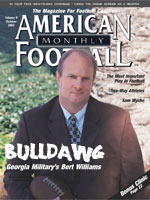AMERICAN FOOTBALL MONTHLY THE #1 RESOURCE FOR FOOTBALL COACHES
Article CategoriesAFM Magazine
|
Nice Guys Finish FirstGarden City Community College\'s Bob Larson proves that good guys can reach the topby: Aaron S. Lee © More from this issue Former Brooklyn Dodgers manager Leo Durocher was often quoted as saying that “Nice guys finish last.” But perhaps in the case of Garden City Community College (Kan.) head football coach Bob Larson, that isn’t necessarily the case. In fact, trying to find someone with something negative to say about Coach Larson is like trying to find a proponent of the Bowl Championship Series at a mid-major. The fans love him, the athletes love him, the coaching staff loves him and even the opposing teams love him. Face it, Larson is well liked and will probably remain that way. However, don’t let Larson, whose gruff – yet gentle – voice reminds you more of your grandfather than of your football coach, fool you. This guy is a master motivator bent on drawing ....The full article can only be seen by subscribers. Subscribe today!
|
|
|||||||
| HOME |
MAGAZINE |
SUBSCRIBE | ONLINE COLUMNISTS | COACHING VIDEOS |
Copyright 2026, AmericanFootballMonthly.com
All Rights Reserved





